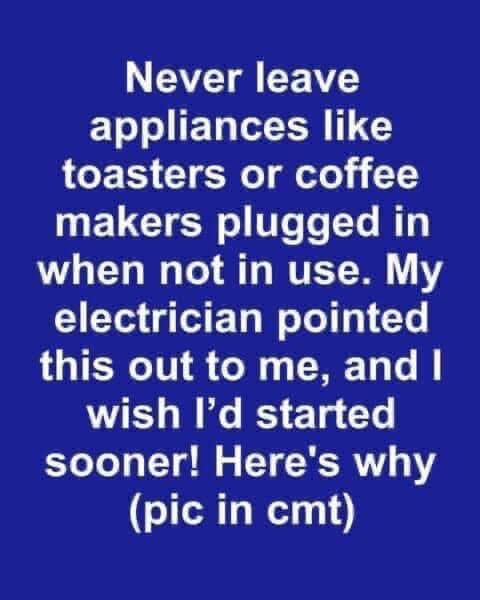In today’s modern homes, appliances like toasters and coffee makers have become essential, but many people overlook the importance of unplugging them when not in use. This simple habit can enhance safety, reduce energy consumption, and minimize environmental impact. After my electrician highlighted this issue, I began to realize the significant benefits of making unplugging a daily practice.
One major risk of leaving appliances plugged in is that they continue to draw power even when turned off, leading to unnecessary energy waste and higher electricity bills. This phenomenon, known as “phantom load” or “standby power,” contributes to a larger carbon footprint. Beyond energy concerns, plugged-in appliances are also vulnerable to electrical surges, which can damage devices or even start fires.
Fires caused by electrical malfunctions are more common than many realize, and reducing unnecessary risks is crucial for household safety. Unplugging appliances when they’re not in use is an easy yet effective way to protect your home, save money, and conserve energy. By adopting this habit, individuals can make a meaningful impact on both personal safety and environmental preservation. Recognizing these risks underscores why unplugging appliances is a small but powerful change everyone should embrace.
In today’s modern households, small appliances like toasters, coffee makers, and microwaves have become indispensable. However, many people fail to recognize the importance of unplugging these devices when they’re not in use. What seems like a minor detail can actually have significant implications for safety, energy efficiency, and environmental impact. After a conversation with my electrician, I started paying closer attention to this issue and quickly realized the benefits of making unplugging a daily habit.
One of the most surprising risks of leaving appliances plugged in is their continued power consumption, even when they are turned off. This phenomenon, known as “phantom load” or “standby power,” occurs because many appliances draw a small but continuous amount of electricity just by being connected to an outlet. Over time, this wasted energy adds up, leading to higher electricity bills without the user even realizing it. For households with multiple devices plugged in around the clock, these unnecessary costs can become substantial. Reducing phantom load by unplugging devices when they are not in use is a simple yet effective way to cut down on energy waste and lower monthly utility expenses.
Beyond financial concerns, standby power also contributes to a larger carbon footprint. The unnecessary electricity consumption from plugged-in appliances increases demand on power plants, many of which rely on fossil fuels. This, in turn, leads to higher greenhouse gas emissions, which negatively impact the environment. While one household’s energy savings might seem insignificant, widespread adoption of this habit across millions of homes could significantly reduce overall energy consumption and carbon emissions. Unplugging appliances is a small but impactful step toward environmental conservation.
Another critical reason to unplug appliances is the risk of electrical surges, which can damage devices and even pose fire hazards. Electrical malfunctions, often caused by power fluctuations, can result in short circuits or overheating, potentially igniting a fire. Even appliances that appear harmless, such as phone chargers or countertop kitchen devices, can be vulnerable to these risks. While surge protectors can help mitigate some of the dangers, they are not foolproof. The best way to safeguard appliances—and, more importantly, your home—is to unplug devices when they’re not actively being used.
Household fires caused by electrical issues are far more common than many people realize. According to safety experts, overloaded outlets and faulty wiring contribute to thousands of home fires every year. By adopting the habit of unplugging appliances when they are no longer needed, homeowners can take a proactive approach to minimizing these risks. The extra few seconds it takes to pull the plug could make all the difference in preventing a potentially devastating accident.
The benefits of unplugging go beyond safety and energy efficiency—it also promotes the longevity of appliances. Many electronic devices experience wear and tear from continuous exposure to electricity, even in standby mode. By disconnecting them from power sources when not in use, their lifespan can be extended, saving homeowners money on replacements and repairs. Taking care of appliances in this way not only benefits the user financially but also reduces electronic waste, further contributing to environmental sustainability.
As I began implementing this practice in my own home, I quickly noticed the positive effects. My electricity bill showed a slight but noticeable decrease, and I felt more confident about the safety of my household. It also became second nature to unplug devices as part of my daily routine, reinforcing a mindful approach to energy use. Encouraging family members to adopt this habit helped create a safer and more energy-conscious home environment.
While it may seem like a minor change, the act of unplugging appliances has significant advantages. From lowering energy costs and reducing carbon emissions to preventing electrical hazards and extending the life of devices, this simple habit offers multiple benefits. Making small adjustments in daily routines can lead to meaningful improvements in both personal well-being and environmental preservation. Taking the extra step to unplug is a decision that not only protects your home but also contributes to a more sustainable future.






